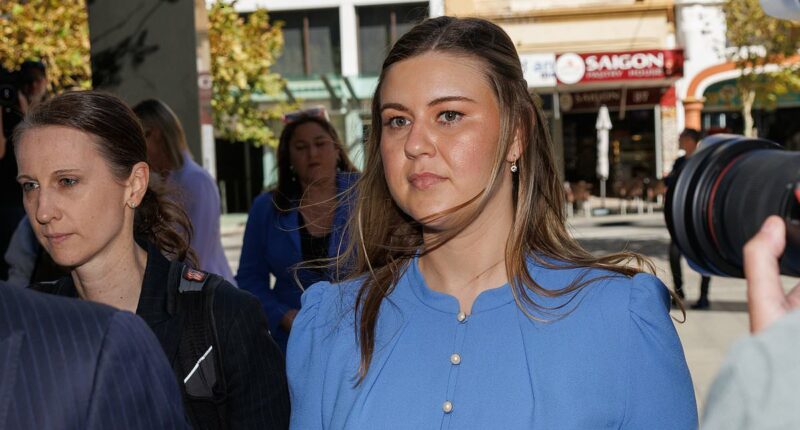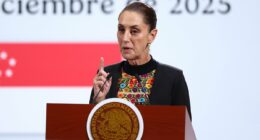Share this @internewscast.com
Brittany Higgins’ legal team cautioned Linda Reynolds that suing a staffer who was allegedly assaulted in her office was not a path to regaining her reputation, revealed by new documents highlighting last-minute legal maneuverings before their high-profile defamation trial began.
Following the loss of her defamation case, the former Liberal staffer must pay 80 percent of Reynolds’ legal expenses, which are anticipated to exceed $1 million.
This sum is in addition to the $340,000 in damages Justice Paul Tottle already granted to Reynolds after determining that Higgins and her husband David Sharaz defamed her in several online posts.
His damning costs order, published on Tuesday, found that Ms Higgins’ offer of settlement was ‘unreasonable’.
Recently released documents from the WA Supreme Court illustrate how Higgins’ lawyer, Carmel Galati, attempted to convince Reynolds’ legal representatives to accept a settlement proposal dispatched just four days prior to the trial’s commencement.
The proposal entailed Higgins’ parents contributing $200,000 towards Reynolds’ legal fees and suggested a 160-word ‘statement of mutual regret,’ importantly lacking any apology.
On July 29, 2024, Perth-based solicitor Ms. Galati, under the guidance of Higgins’ lawyer Leon Zwier, sent a detailed five-page letter offering the settlement and a robust argument for why Reynolds should agree to it.

Brittany Higgins ‘ lawyers warned Lind Reynolds that she would ‘never restore her reputation by suing a staffer raped in her office’ in new documents that reveal the last-minute legal wranglings before their blockbuster defamation trial began (pictured: Ms Higgins arrives at the David Malcolm Justice Centre in Perth with her solicitor Carmel Galati, left and her lawyer Leon Zwier, right)

New documents released by the WA Supreme Court reveal how Ms Higgins’ lawyer, Carmel Galati (pictured, left), sought to persuade Reynolds’ legal team to accept an offer of settlement, which was sent just four days before the trial began
The letter hinted that it had been difficult to communicate with Ms Higgins, with Ms Galati apologising for the ‘delay’ in sending the letter, noting that she ‘would have liked to have sent it earlier’.
‘As you know, it has been difficult obtaining instructions from my client in relation to issues that are so sensitive like this one,’ Ms Galati stated.
‘My client may never overcome the trauma she suffered as a consequence of the rape and remains immovable in relation to what she regards as the requests for her to abandon her feelings and beliefs about that traumatic event and the immediate aftermath.’
The letter then boldly stated that Ms Higgins’ legal team would ‘see a successful defence of the claim’, before outlining why Reynolds’ claim would fail.
‘Your client remains at risk even if she is successful,’ Ms Galati warned.
‘Your client will never restore her reputation by suing a staffer raped in her office.’
Ms Galati then claimed that the $2.4 million compensation payout Ms Higgins was awarded by the Commonwealth in 2022 for bullying and victimisation in the aftermath of her rape was not on the table.
‘The personal injuries damages paid by the Commonwealth to my client would never have been, are not and will never be available to meet any judgment your client may obtain against mine.’

It took Reynolds’ lawyer, Martin Bennett (pictured, second from right), just 29 minutes to reject the offer, stating it was ‘unreasonable’ under the terms of the Defamation Act
Ms Galati added: ‘Your client will no doubt be monitoring the continual social media and be aware that she is the subject of continuing adverse publicity in that respect.’
In addition to the $200,000, the offer of settlement contained a ‘mutual statement of regret’.
But to ward off any future disputes about how much was paid – and, crucially, by whom – Ms Higgins’ lawyers insisted on a caveat.
‘The fact of and sum would remain confidential unless there is a publication of incorrect details of the settlement, in which case my client has the right to make clear what the correct details are, of the fact and sum of the payment,’ they stated.
Reynolds had evidently insisted in mediation that Ms Higgins was herself to pay any compensation, but the former Liberal staffer’s lawyers insisted this was ‘unreasonable’.
‘Our client’s family are gravely concerned about their daughter’s well-being for good reasons, and your client should be sensitive to that issue too,’ they added.
A further $10,000 to be given to a women’s refuge or charity was also on the table. This sum would also be paid by Ms Higgins’ parents.
However, there was no apology – only a reference to a previous apology that Ms Higgins had given to Reynolds and her former chief of staff Fiona Brown for any ‘hurt and distress’. This was mirrored by the ‘hurt and distress’ Ms Higgins had also suffered.

Reynolds’ lawyer Mr Bennett (pictured) was this week vindicated by Justice Tottle’s excoriating costs order, which contained a five-point take-down of exactly why it fell short
‘They both agree to put these matters behind them and move on,’ the statement added.
It took Reynolds’ lawyer, Martin Bennett, just 29 minutes to reject the offer, stating it was ‘unreasonable’ under the terms of the Defamation Act.
Ms Galati amended the letter and asked Mr Bennett to consider it once more. but he rejected it again.
‘The offer provides no vindication of my client’s reputation and given the lateness of the offer the proposed contribution to my client’s costs is inadequate,’ he stated.
‘Unlike your client who has been mostly represented on a pro bono basis my client has been forced to incur costs of the proceedings.
‘I disagree with your assessment of the strength of my client’s case.’
Mr Bennett was this week vindicated by Justice Tottle’s excoriating costs order, which contained a five-point take-down of exactly why it fell short.
‘First, the offer did not provide the plaintiff with any vindication of her reputation,’ he ruled.
Secondly, the statement ‘fell short of an apology by a substantial margin’ – about as scathing as it gets in legal language.
‘(Reynolds’) characterisation of it as a statement to the effect the parties have agreed to disagree is accurate,’ Justice Tottle ruled.
‘As appears to have been (Higgins’) intention, the mutual statement would have conveyed (she) maintained the truth of the defamatory statements made by her.
‘The reference to the previous apology accentuated the absence of an apology in the statement itself.’
Thirdly, the insistence that Ms Higgins would be able to break confidentiality got short shrift from Justice Tottle.
‘The reservation of the right to publish a correction in the event of a publication of incorrect details of the settlement would have enabled the defendant to say she had not paid any money to the plaintiff in settlement of the claim,’ he stated.
Fourthly, there was ‘no offer of compensation’.
And finally, it was all too little, too late.
‘The offer was made four days before the day on which the trial was to commence and after the plaintiff had incurred the costs of preparing for trial,’ he observed.
‘As was recognised by the defendant, $200,000 could only have been a contribution to the plaintiff’s costs.’
Justice Tottle branded the offer of settlement ‘unreasonable’.
‘It may have been difficult for the defendant to bring herself to consider making a settlement offer to the plaintiff, but this does not mean it was not unreasonable for her to have failed to have done so,’ he observed.
He was also critical of the legal advice Ms Higgins had received.
‘Although the defendant’s ‘trial team’ were retained only shortly before the trial, the defendant was represented by experienced lawyers from the very first stages of the dispute,’ he added.
















